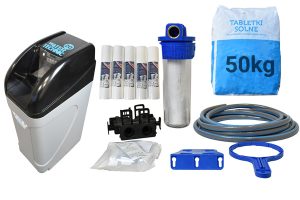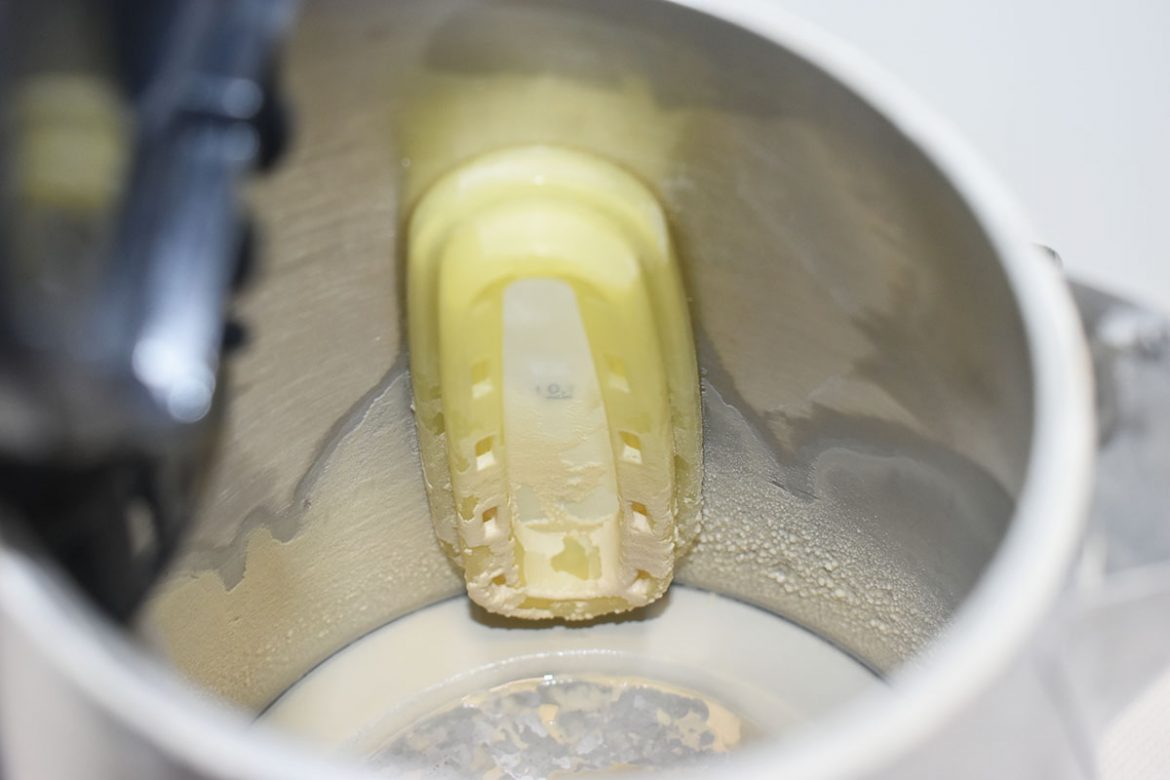Wciąż zauważasz osad w postaci kamienia na kranach, naczyniach. Twój płyn słabo się pieni, dolewasz go więcej. Twoje pranie wymaga dodania większej ilości proszku. Wszechobecny kamień wymaga zużycia dodatkowych środków. Co zrobić, by twardość wody nie komplikowała komfortu życia w domu ?
Czym jest twardość wody?
Twardość wody to właściwość, która mówi o stężeniu pewnych pierwiastków w niej zawartych. O wodzie twardej mówimy wówczas, kiedy zawiera ona jony wapnia, jony magnezu oraz inne metale. Im więcej jest tych jonów, tym woda jest twardsza. Stężenie tych głównych pierwiastków decyduje o twardości ogólnej. Oba związki łatwo krystalizują i mają wpływ na powstawanie osadów.
Stopnie twardości wody
Zalecana twardość wody wg norm wynosi od 60 do 500 mg CaCO3/dm3, a w skali niemieckiej to 3,36 do 28 dH. Woda w wodociągach może różnić się w zależności od miejsca położenia na mapie. Jej smak także może zdecydowanie różnić się w zależności od stopnia twardości.
[su_box title=”Skala twardości wody” box_color=”#919185″ title_color=”#141413″ radius=”2″] bardzo miękka <75 mg CaCO3/dm3
miękka 75-150 mg CaCO3/dm3
średnio twarda 150-300 mg CaCO3/dm3
twarda 300-500 mg CaCO3/dm3
bardzo twarda >500 mg CaCO3/dm3 [/su_box]
Twardość wody można sprawdzić wizualnie poprzez ocenę ilości kamienia na elementach grzejnych lub przez ilość piany, która wytworzy się po dodaniu detergentu. Twardą wodę można również rozpoznać poprzez smak. Jednak najpopularniejszym sposobem na sprawdzenie, z jaką wodą mamy do czynienia jest zastosowanie specjalnych urządzeń oraz odczynników.
Skutki twardości wody w domu
Twardość wody jest cechą mającą zdecydowany wpływ na jej napięcie powierzchniowe. Im większe jest to napięcie, tym trudniej woda zwilża powierzchnie. W efekcie trudniej jest sprać plamy z tkanin czy zmyć naczynia. W rezultacie musisz zużywać więcej detergentów, proszków czy płynów do zmiękczania tkanin. Przy bardzo twardej wodzie łatwo zaobserwować, że mydła i płyny nie chcą się po prostu pienić. Stopień twardości wody przekłada się także na stan techniczny używanych urządzeń agd. Twarda woda powoduje osadzanie się kamienia w czajniku, zmywarce czy ekspresie do kawy. Jeśli jesteś miłośnikiem aromatycznej kawy czy herbaty, z całą pewnością miałeś okazję zauważyć twardość wody użytej do przyrządzenia. Osad od bardzo twardej wody można zauważyć w kubku czy filiżance po gorącym napoju. Skutkiem zbyt twardej wody mogą też być przebarwienia w zlewie, wannie czy w kabinie prysznicowej.
Większa awaryjność pieców i grzejników również związana jest ze zbyt twardą wodą i osadzającym się kamieniem. Ponadto, w rezultacie następuje strata ciepła. Kamień kotłowy, który osadza się na grzałkach może znacząco wpływać na ich przepalanie się. W najgorszym wypadku kamień może spowodować niedrożność rur, co może obniżyć ciśnienie wody. O zbyt niskim ciśnieniu w rurach przeczytasz tutaj. Przy zbyt miękkiej z kolei wodzie, istnieje ryzyko korozji. Najbardziej niekomfortowym skutkiem korzystania z twardej wody jest przesuszenie skóry po myciu. Kondycja Twojej skóry oraz włosów w dużym stopniu uzależniona jest od jakości wody, której używasz do pielęgnacji.
Sposoby zmiękczania twardej wody w domu
Należy pamiętać, że twardość wody oraz kamień są ściśle ze sobą powiązane. Kamień powstaje na skutek zawartych w wodzie m.in. soli wapnia oraz soli magnezu. Ogólnie, zmiękczenie twardej wody polega na częściowym lub całkowitym usunięciu z niej jonów wapnia i magnezu. Istnieje wiele metod na usuwanie twardości wody.
Najprostrzym sposobem na wysoką twardość wody jest obróbka cieplna, czyli gotowanie. W procesie podwyższenia temperatury kwaśne węglany wapnia i magnezu ulegają rozpadowi. Z pewnością widziałeś nie raz osad w czajniku po ugotowaniu wody. To trudno rozpuszczalny węglan wapnia, tzw. kamień.
Kolejną prostą metodą otrzymania miękkiej wody jest zamrażanie. Jednak proces poddania wody niskim temperaturom jest długotrwały i mało praktyczny.
Bardzo skutecznym sposobem zmiękczania wody jest wymiana jonów wapnia i magnezu na naturalne jony sodu przy pomocy urządzenia, jakim jest zmiękczacz wody. Proces zmiękczania w tym wypadku polega na powolnym przesączaniu się wody przez tzw. żywicę jonowymienną znajdującą się w urządzeniu. Twardość wody wyznaczyła na rynku szeroką ofertę zmiękczaczy różniącą się pojemnością czy dodatkowymi funkcjami ułatwiającymi korzystanie. Godne uwagi są zmiękczacze wody Water Technic polskiego producenta Technika Wody. Urządzenia tej marki pozwalają na precyzyjny dobór parametrów do własnych potrzeb. Zdecydowanie dla najbardziej wymagających użytkowników.

Zmiękczacz do wody Water Technic
Innymi systemami filtrującymi dostępnymi na rynku są dzbanki z wymiennymi filtrami. Są niedrogie, ale służą głównie do małej konsumpcji.
Szybką i stosunkowo ekonomiczną metodą zmiękczania twardej wody jest zastosowanie gotowych środków chemicznych. Odczynnikami spożywczymi w tym przypadku mogą być: sok z cytryny, kwas cytrynowy, kwas octowy czy proszek do pieczenia.
Podwyższoną twardość wody można także obniżyć dzięki syntetycznym środkom chemicznym w postaci proszku czy tabletek. Pomagają one zachować długą żywotność urządzeń takich jak zmywarki, pralki czy ekspresy do kawy.
Jak widać, twardość wody jest cechą mającą wpływ na wiele aspektów naszego życia i zdrowia. Sposobów zmiękczania wody jest wiele. Wszystko zależy od skali problemu, potrzeb indywidualnych użytkownika, a także zawartości portfela.
